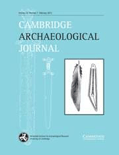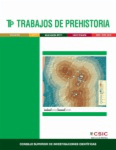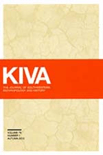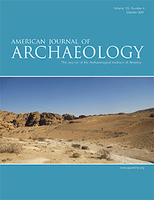
CAMBRIDGE ARCHAEOLOGICAL JOURNAL
Scope & Guideline
Pioneering Research, Preserving Heritage
Introduction
Aims and Scopes
- Interdisciplinary Approaches to Archaeology:
The journal promotes research that integrates various disciplines such as anthropology, history, and art history to provide a comprehensive understanding of archaeological findings. - Material Culture Studies:
A key focus is on the analysis of artifacts and material culture, examining how objects inform us about social practices, identities, and cultural transformations. - Social Dynamics and Identity:
Research often explores social organization, identity formation, and the role of communities in shaping archaeological narratives, particularly through the lens of gender, ethnicity, and power dynamics. - Methodological Innovation:
The journal encourages the use of cutting-edge methodologies, including digital archaeology, material analysis, and theoretical frameworks such as posthumanism and new materialism. - Cultural Heritage and Ethics:
A consistent theme involves discussions on the ethics of archaeological practice, cultural heritage management, and the implications of archaeology for contemporary society.
Trending and Emerging
- Posthumanism and New Materialism:
There is a growing interest in posthumanist perspectives that challenge anthropocentric views in archaeology, emphasizing the agency of non-human actors and material culture in shaping human experiences. - Indigenous and Decolonial Approaches:
Emerging themes include the incorporation of indigenous knowledge systems and decolonial frameworks, which aim to address historical injustices and promote collaborative research practices. - Cognitive and Emotional Archaeology:
Research increasingly explores cognitive processes and emotional engagements with material culture, offering insights into how past societies understood and interacted with their world. - Environmental Archaeology and Climate Change:
A notable trend is the integration of environmental archaeology with discussions on climate change, focusing on human-environment interactions and the implications for future sustainability. - Social Networks and Connectivity:
There is an emphasis on studying social networks and connectivity in ancient societies, utilizing methodologies like network analysis to understand interactions across regions and cultures.
Declining or Waning
- Traditional Typological Studies:
There has been a noticeable decline in papers focused solely on traditional typological classifications of artifacts, suggesting a shift towards more contextual and relational analyses. - Overemphasis on Chronological Frameworks:
Research that heavily relies on strict chronological frameworks without considering broader cultural and social contexts appears to be decreasing, as scholars increasingly favor integrative approaches. - Regional Studies with Limited Scope:
Papers focusing narrowly on specific regions without connecting to broader global or comparative contexts have become less common, reflecting a trend towards more integrative and transnational studies. - Historical Archaeology in Isolation:
The focus on historical archaeology as a standalone discipline, without its connections to contemporary issues or broader archaeological methodologies, seems to be waning. - Conventional Artifact Functionality Studies:
There is a diminishing interest in studies that only address artifact functionality without examining their social, cultural, or symbolic meanings.
Similar Journals

Britannia
Navigating the Depths of Archaeological and Historical InquiryBrittannia is a prestigious journal published by Cambridge University Press that serves as a cornerstone for scholars and enthusiasts in the fields of Archaeology, Classics, and History. With its ISSN of 0068-113X and E-ISSN of 1753-5352, the journal has been committed to disseminating high-quality research and innovative studies since its inception in 1970, addressing vital topics that span cultural, historical, and archaeological dimensions. As a hallmark of academic rigor, it maintains a Q1 ranking in Classics and History and a Q2 ranking in Archaeology (both Arts and Humanities, 2023), reflecting its impact and significance in these disciplines. Although not an Open Access journal, it provides invaluable content for researchers, professionals, and students alike, ensuring that vital insights into ancient civilizations and cultural heritage resonate well beyond the pages of each issue. With upcoming publications scheduled through 2024, Brittannia continues to be an essential resource for anyone invested in the legacies of the past.

Trabajos de Prehistoria
Bridging Disciplines to Illuminate Our Prehistoric HeritageTrabajos de Prehistoria is a distinguished peer-reviewed journal published by the Consejo Superior de Investigaciones Científicas (CSIC) since 1988, and it has established itself as a vital resource in the field of archaeology and prehistory. With an impressive impact factor and an open access policy, the journal aims to disseminate high-quality research that contributes to the understanding of human history and prehistorical studies. This Spanish journal has consistently ranked in the top quartile (Q1) in both the Arts and Humanities and Social Sciences categories, reflecting its significance in advancing archaeological scholarship, with Scopus rankings placing it in the 85th percentile among its peers. Covering a broad scope of topics related to archaeology, it serves as a platform for innovative research that connects researchers, professionals, and students globally, enhancing academic dialogue and fostering interdisciplinary collaboration. Based in Madrid, European researchers and global academics alike benefit from its open access model, promoting wider distribution and accessibility of foundational studies in the field.

Cuadernos de Prehistoria y Arqueologia-Universidad Autonoma de Madrid
Uncovering the Past, Shaping the FutureCuadernos de Prehistoria y Arqueologia-Universidad Autonoma de Madrid is a distinguished academic journal dedicated to the fields of archaeology and prehistory, published by the Universidad Autonoma de Madrid, Departamento de Prehistoria y Arqueología. With an ISSN of 0211-1608, this journal plays a crucial role in disseminating significant research findings and theoretical advancements within these domains. Recognized for its scholarly excellence, it holds impressive quartile rankings in 2023, including Q2 in Archaeology and Q1 in History, reflecting its high impact within the academic community. While currently not an open-access publication, Cuadernos de Prehistoria y Arqueologia provides valuable insights to researchers, professionals, and students engaged in the exploration of human history and cultural heritage from 2018 to 2024 and beyond. With a commitment to fostering interdisciplinary dialogue, this journal serves as an essential platform for innovative studies and comprehensive reviews, contributing to the advancement of knowledge in archaeology and prehistory.

Archipel-Etudes interdisciplinaires sur le monde insulindien
Innovating Insights into Insulindian SocietiesArchipel-Etudes interdisciplinaires sur le monde insulindien is a leading scholarly journal published by ASSOC ARCHIPEL, focusing on the interdisciplinary study of the insular world, particularly in the domains of archaeology, history, literature, and cultural studies. With a unique blend of perspectives, this journal aims to disseminate innovative research and foster dialogue among scholars exploring the complexities of insulindian societies and their histories. Recognized for its academic rigor, the journal is indexed in several prestigious categories with varying quartiles, including Q3 rankings in History and Literature and Literary Theory, highlighting its impact in these crucial fields. Despite being a newer entrant since its inception in 2009, the journal has rapidly gained visibility and an engaged readership, contributing to a more profound understanding of island cultures within a global context. Although it does not operate under an Open Access model, its value as a repository of significant academic discourse makes it an essential resource for researchers, professionals, and students interested in the intricate layers of insular studies. Based in Paris, France, this journal continues to support and cultivate scholarly exchange in the multifaceted arena of insulindian research.

Kiva-Journal of Southwestern Anthropology and History
Celebrating the Legacy of Southwestern CulturesKiva - Journal of Southwestern Anthropology and History is a distinguished academic journal published by Routledge Journals, Taylor & Francis Ltd, that serves as a vital resource for scholars in the fields of anthropology, archaeology, and history. With an ISSN of 0023-1940 and an E-ISSN of 2051-6177, this journal has established itself as a significant avenue for scholarly communication since its inception in 1964. It consistently ranks in the top quartiles, including Q1 in Archaeology and Q2 in Anthropology, reflecting its high impact and rigorous peer-review process. Covering a wide array of topics pertinent to the Southwestern United States, Kiva invites original research articles, reviews, and methodological papers that advance understanding of the region's rich cultural heritage and historical narratives. While currently not open access, its commitment to disseminating quality research makes it an essential reading for researchers, professionals, and students aiming to explore the multifaceted dimensions of southwestern studies.

PROCEEDINGS OF THE ROYAL IRISH ACADEMY SECTION C-ARCHAEOLOGY CELTIC STUDIES HISTORY LINGUISTICS LITERATURE
Connecting Disciplines, Cultivating InsightsPROCEEDINGS OF THE ROYAL IRISH ACADEMY SECTION C - ARCHAEOLOGY, CELTIC STUDIES, HISTORY, LINGUISTICS, LITERATURE is a distinguished academic journal published by the Royal Irish Academy, based in Dublin, Ireland. With a focus that spans vital areas of research including archaeology, Celtic studies, history, linguistics, and literature, this journal plays a crucial role in the dissemination of scholarly work that enriches our understanding of these interconnected fields. The journal holds an impressive standing in academia, featuring prominently in several Scopus categories, with a Q1 ranking in Literature and Literary Theory, highlighting its significant impact and relevance. Although currently not open access, it assures potential readers of the rigor and quality upheld in its publications through selective peer-review processes. This journal serves as an essential resource for researchers, professionals, and students alike, eager to engage with innovative studies and discussions that underpin Ireland's cultural and historical heritage.

Archaeologia Baltica
Uncovering the Rich Tapestry of Baltic HistoryArchaeologia Baltica, published by the Institute of Baltic Region History & Archaeology at Klaipeda University, stands as a premier platform in the field of archaeology, with a specific focus on the Baltic region. This esteemed journal, which boasts a Q1 ranking in both the Arts and Humanities and Archaeology categories as of 2023, serves as a critical resource for scholars, researchers, and students dedicated to the exploration of archaeological horizons. Featuring an array of original research articles, reviews, and theoretical discussions, it aims to advance knowledge and foster dialogue in the diverse fields of archaeology. Though currently not an open-access publication, Archaeologia Baltica enjoys a commendable position in the Scopus rankings, underscoring its importance in shaping contemporary archaeological discourse. The journal not only reflects rigorous academic standards but also invites contributions that encourage collaborative efforts in the study of our shared cultural heritage.

AMERICAN JOURNAL OF ARCHAEOLOGY
Illuminating History Through Rigorous ResearchThe American Journal of Archaeology (ISSN: 0002-9114, E-ISSN: 1939-828X), published by the esteemed University of Chicago Press, stands as a leading scholarly journal in the field of archaeology, celebrated for its rigorous peer-reviewed research. With an impressive impact factor that places it in the Q1 quartile for both archaeology and archaeology within the arts and humanities, this journal ranks among the top 15% in its field, according to Scopus metrics. It serves a global audience of researchers, professionals, and students, facilitating the dissemination of innovative findings from excavations, historical analyses, and methodological advancements. While primarily available through subscription, the journal's archives and features provide invaluable resources for deepening one's understanding of the past and engaging with current archaeological discourse. Operating from its home in Chicago, USA, the American Journal of Archaeology actively contributes to the advancement of knowledge and scholarship in archaeology, making it an essential platform for those invested in the exploration of ancient civilizations and cultural heritage.

Southern African Humanities
Advancing knowledge in Southern African cultures.Southern African Humanities is an esteemed academic journal published by the Natal Museum, dedicated to advancing the fields of anthropology, archaeology, and cultural studies with a particular focus on the Southern African context. Since its inception in 2008, the journal has consistently provided a platform for innovative research and scholarly discourse, earning a prominent reputation with a 2023 impact factor that places it in the Q2 and Q1 quartiles across multiple relevant categories, including Anthropology, Archaeology, and History. The journal is recognized for its rigorous peer-review process and dissemination of high-caliber research, exemplified by its Scopus rankings, which reflect its widespread influence within the humanities. Although it does not currently offer open access options, the journal remains pivotal for researchers, professionals, and students aiming to deepen their understanding of Southern African cultures and historical contexts. Located in Pietermaritzburg, South Africa, Southern African Humanities continues to be an essential resource for those engaged in the humanities, enhancing knowledge and fostering research collaborations within the region and beyond.

Yorkshire Archaeological Journal
Exploring the Depths of Archaeological DiscoveryYorkshire Archaeological Journal, published by Routledge Journals, Taylor & Francis Ltd, stands as a pivotal resource in the field of archaeology, particularly focused on the rich heritage and archaeological research within the Yorkshire region of the United Kingdom. With a dedicated ISSN of 0084-4276 and an E-ISSN of 2045-0664, this journal provides both researchers and practitioners valuable insights into archaeological discoveries, methodologies, and theoretical frameworks. While it holds a Q3 ranking in both Archaeology (Arts and Humanities) and Archaeology (Social Sciences), its contributions remain significant for advancing discussions and knowledge within the discipline. The journal's archival depth, converging from as early as 1980 and continuing robustly into 2024, showcases a commitment to fostering academic discourse and exploration of archaeological heritage. Although it does not currently offer open access, its rigorous peer-reviewed articles make it an essential reference for academics, professionals, and students alike who are eager to deepen their understanding of archaeology and its applications.